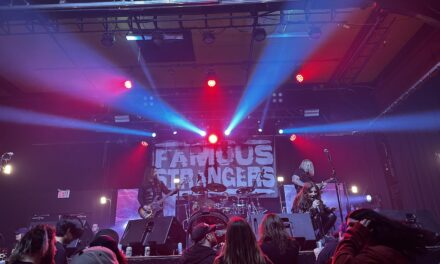
Review and photos by Brooklyn Hollinger
When myth meets melody, all sorts of things can happen. As someone who is familiar with myth, and interested in being just as familiar with musicals, I went into Hadestown ready to see the possibilities that performance can bring to an age-old story.
Hadestown is developed with and directed by Rachel Chavkin, with music, lyrics and the book written by Anaïs Mitchell. Hadestown first premiered in Vermont in 2006, and was revised off Broadway in 2016. In 2017 it was staged at the Citadel in Edmonton, and following productions in London, it premiered on the Broadway stage in 2019. Hadestown also won eight Tony Awards, including Best Musical and Best Original Score. The musical ran in Edmonton from November 14-19, 2023, at the Northern Alberta Jubilee Auditorium, one stop in its current North American tour.
Hadestown is the story of Eurydice (Amaya Braganza) who goes to work in the industrial version of the Underworld, where the King and Queen of the Underworld, Hades (Matthew Patrick Quinn) and Persephone (Lana Gordon) live. Orpheus (J. Antonio Rodriguez), her singer-songwriter lover, goes to rescue her.
I felt a bit out of place when I first entered the lobby of the Jubilee. It could have been that I chose to wear jeans with a nice top, where everyone else was dressed elegantly: women in sleek pencil skirts, and men in formal suits. I even saw one person dressed head to toe in a bejeweled orange jumpsuit–although that might have been a bit overkill.
People were milling about with an uncanny lime-green coloured drink, and I knew I had to find out what it was. Once I got my hands on the speciality cocktail, “The Prophecy Fortold,” I fitted right in. It was a delicious blend of vodka, blue curacao, and orange juice – and when you mixed it together it turned green!
I had brought my mom with me, who has little to no knowledge of Greek mythology, and before the musical I gave her the rundown in the car. Hadestown is based on the Greek myth of Orpheus and Eurydice. The pair are in love and on the day of their wedding Eurydice gets bit by a poisonous snake and dies. Orpheus then travels to the Underworld to get her back, but he meets Hades and Persephone. After Orpheus serenades them with his unrivalled musical talents, Hades tells Orpheus he can bring his wife back on one condition: Orpheus has to lead Eurydice from the Underworld without looking back at her. If he does, she remains dead in the Underworld. He ultimately ends up turning around, looking at her, and the two do not get to be reunited.
The set was practical, with two small staircases on each side of the stage, a balcony at the back, and a cluster of tables and chairs in the centre. The colour was a tad bland, with a mix of gray, brown, black, and silver that faded into the background. Its design also had lot’s of janky metal and steam, reiterating the fact that this play takes place in the industrial version of the Underworld. When I was watching the performance I realized it was intended to be a practical set; meant for the inclusion of the band on stage, and to show the industrial components of the musical. To add to this, the fog machine was working overtime trying to replicate steam, and clouds of smoke. While the visuals were bland because of practicality, the functionality worked well.

On the left side of the stage there was the violinist, trombonist, cellist, and percussionist. On the right was the pianist, guitarist, and double bassist. I liked being able to see them actually play on stage, and at certain moments in the songs I could pinpoint exactly which musician was playing. The trombonist stole the show multiple times. At one point, she skipped to centre stage with a spotlight on her, and played a solo while dancing.
The music was extremely versatile, and was part of what kept me intrigued throughout the duration of the show. It ranged from a jazzy swing, like in “Livin’ it Up on Top”, to a woeful blues sound in “Why We Build the Wall.” The blend of musical genres was refreshing, and I was more open to the dramatic ballads, like “Wait for Me,” than I would normally be if it was the same slow pace throughout.
Each singer had a distinct personality and singing voice. Being at the very back of the theatre, I couldn’t really see their faces. However the varying costumes and the way each singer both spoke and sang, made it easy to let go of the fact that, to me, they were just faceless actors.
Will Mann (Hermes) had a low narrating voice, and acted as a guiding character for both Orpheus and Eurydice. He was extremely confident and bold: there were instances where he would take Orpheus or Eurydice by the hand and physically bring them to where they needed to be. He cracked jokes every now and then in his songs, and guided the audience through the story.
This interpretation of Hermes is not how I would have perceived him. In Greek myth he’s usually lacking in personality and mindlessly goes from place to place delivering people’s messages. Yet, I was pleasantly surprised with this competent portrayal of the god. At the end of the performance, I was a bit sad he wasn’t in it more.
Braganza (Eurydice) had the strongest voice out of all the others. It was raspy in the right places, and she enunciated every word. I could hear the different emotions in her voice throughout the songs: yearning, desperation, fear. Her voice never faltered, and she would hold notes for so long that the audience couldn’t help but cheer (myself included).
As talented as Gordon (Persephone) was, I wasn’t a big fan of her voice. She could have been going for a certain persona for the character, but I found her voice to be scratchy and loud. She was a very compelling character though, especially the way she portrayed Persephone as the more compassionate person in her and Hades’ relationship. Unfortunately, the throaty singing voice just didn’t do it for me.
Rodriguez (Orpheus) was unique within the cast, as he sang high notes that even I wouldn’t be able to muster. Sadly, this was the most compelling thing about his character. Orpheus in Hadestown is a shy and unsure man who is desperately in love with Eurydice. However, I wasn’t entirely convinced of his role as the love interest. In mythology, Orpheus is a confident and headstrong man. A character that I want to root for. Yet this depiction of Orpheus had me uninterested, and I was captivated more by his love interest, Eurydice, instead.
The absolute showstopper for me was Quinn’s performance as Hades. Everything from his walk, to his voice was the epitome of how a villain should act, and I was captivated everytime he was on stage. At times he would deliver his lines in an eerie, almost still voice that made me sit like a statue in my seat. Other times he would shout his lines in a booming voice, where there was no need for a microphone. Sometimes his voice would go so deep, it could nearly match the lowest key on a piano. His presence on stage as Hades was alluring, and was hands-down my favourite to watch.
Because of the cast’s exceptional performances, the entire production was engaging, and it captivated me from start to finish. The only time my eyes strayed from the cast was to figure out who in my section was hysterically weeping when Eurydice had to go back to the Underworld. She was sobbing so loud I was questioning why I wasn’t crying as well.
My expectations for Hadestown were more than exceeded, and after experiencing the performance, I can see why people pay up to $200 to be in the front row. As I applauded the cast, grinning with my ear-to-ear smile, I can say I had a much more successful trip to Hadestown than Orpheus did.
Hadestown
website
Jubilee, Edmonton
November 14-19, 2023
click here for another edmonton scene review of Hadestown



